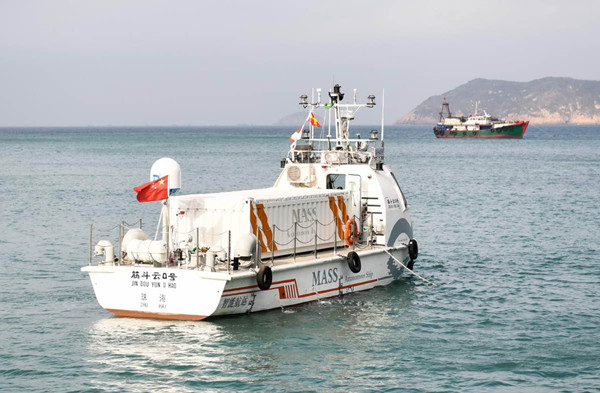

China's first autonomous cargo ship, M/V Jindouyun 0 Hao, conducts its maiden voyage in Zhuhai, a special economic zone in Guangdong province, on Sunday. [Photo/Xinhua]
China's first autonomous cargo ship completed its maiden voyage after a grand inaugural ceremony in the Zhuhai Special Economic Zone of Guangdong province on Sunday, playing an important role in the country's efforts to speed up the planning and development of its intelligent shipping industry.
The ship, M/V Jindouyun 0 Hao, has attracted wide attention from the industry at home and abroad as it has realized independent tracking, collision avoidance and remote control berthing and unberthing of independent cargo ships.
Yan Xinping, an academician from the Chinese Academy of Engineering, said the ship has established an important platform to promote the technological progress and industrial development of intelligent ships.
"The successful voyage of the autonomous cargo ship has officially opened the exploration and practice of independent navigation and promotes the development process of the intelligent shipping industry," Yan said at the launch ceremony held in Zhuhai's Dongao island.
Cai Yuliang, director of science and technology innovation and test center of China Classification Society, also praised the ship's success. CCS provides services to ships, offshore installation and related industrial products by furnishing world-leading technical rules and standards.
"The successful voyage of Jindouyun 0 Hao is of great pioneering significance for the research and development, testing and setting of standards for independent navigation technology," he said.
The ceremony was attended by more than 70 academicians, professors, experts, scholars and government officials from the mainland as well as the Hong Kong and Macao special administrative regions.
A breakthrough in ship design and construction can be achieved by reducing the number of pilots until autonomous navigation is realized, Cai said.
"Under the same load capacity, builders can save more than 20 percent on construction costs and 20 percent on operation costs, reduce fuel consumption by 15 percent and significantly reduce emissions," he said.
The ship is 12.86 meters long and 3.8 meters wide. It has a draft of 1 meter and is designed to travel at 8 knots.
The China Classification Society, Wuhan University of Technology, Zhuhai city government and Yunzhou-Tech, a tech company based in Zhuhai, jointly launched the autonomous cargo ship project during an international maritime show in Shanghai in December 2017. The ship was completed and delivered for use in Zhuhai last month.
Zhang Yunfei, chairman of Yunzhou-Tech, said Jindouyun 0 Hao would actively explore the commercial application of self-navigating ships in the fields of transportation supply and ocean shipping and further expand in-depth cooperation with the China Classification Society, maritime, navigation support and related departments and units to explore the establishment of standards for autonomous navigation ships and promote the rapid development of China's intelligent ship industry in the years ahead.